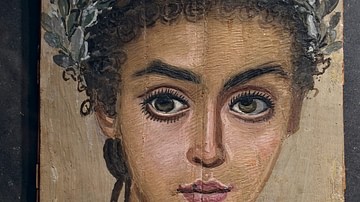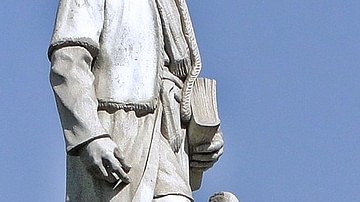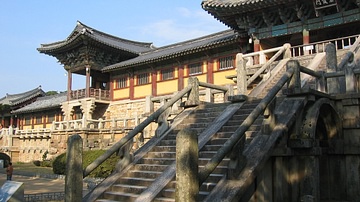Search
Did you mean: Sardis?
Search Results

Definition
Fayum
The Faiyum (also given as Fayoum, Fayum, and Faiyum Oasis) was a region of ancient Egypt known for its fertility and the abundance of plant and animal life. Located 62 miles (100 kilometers) south of Memphis (modern Cairo), the Faiyum was...

Definition
Arjuna
Arjuna (also given as Arjun) is the great hero of the Indian epic Mahabharata and the philosophical-religious dialogue Bhagavad Gita. His name means “shining”, “silver” and similar terms relating to brightness. He is the most popular champion...

Definition
Tomb
A tomb is an enclosed space for the repository of the remains of the dead. Traditionally tombs have been located in caves, underground, or in structures designed specifically for the purpose of containing the remains of deceased human beings...

Definition
Charles the Simple
Charles the Simple (Charles III of France, l. 879-929, r. 893-923) was king of West Francia (roughly modern-day France) toward the end of the period of Viking raids in the region. His epithet `the simple' refers to his habit of being straightforward...

Definition
Kinkakuji
Kinkakuji Temple in Kyoto, Japan, more formally referred to as Rokuon-ji or 'Deer Garden Temple' and otherwise known as 'The Temple of the Golden Pavilion', was first built in 1397 CE. Originally the retirement residence of the shogun Ashikaga...

Definition
Ferdowsi
Abolqasem Ferdowsi (l. c. 940-1020 CE, also given as Abul-Qasem Ferdowsi Tusi, Firdawsi, Firdausi) is the author of the Shahnameh (The Persian Book of Kings), one of the greatest works of world literature and the national epic of Iran. He...

Definition
Bulguksa Temple
The Bulguksa Temple (aka Pulguk-sa Temple or 'Temple of the Buddha Land') was built in the 8th century CE on the wooded slopes of Mt. Tohamsan at the ancient Silla capital of Geumseong (modern Gyeongju, South Korea). The Buddhist temple...

Definition
As You Like It - Learning to Love in Shakespeare's Forest of Arden
As You Like It is a pastoral comedy by William Shakespeare (1564-1616), written in 1599 and likely first performed that same year. Indeed, it is thought to be the inaugural show performed by Shakespeare's acting company, the Lord Chamberlain's...

Article
Twelve Gods of Persian Mythology
Ancient Persian Mythology is the term now referencing ancient Iranian religion prior to the rise of Zoroastrianism between c. 1500-1000 BCE. This was a polytheistic faith with a pantheon led by the supreme god Ahura Mazda (“Lord of Wisdom”...

Article
Ten Ancient Persia Facts You Need to Know
Ancient Persian culture exerted a powerful influence throughout the Near East, and beyond, for over a thousand years between c. 550 BCE - 651 CE and many aspects of their culture continued to influence others afterwards and up through the...